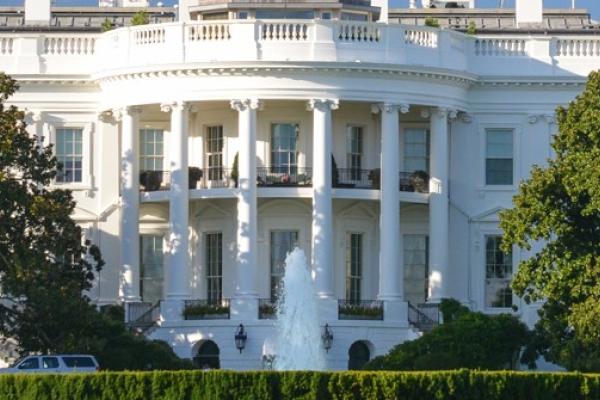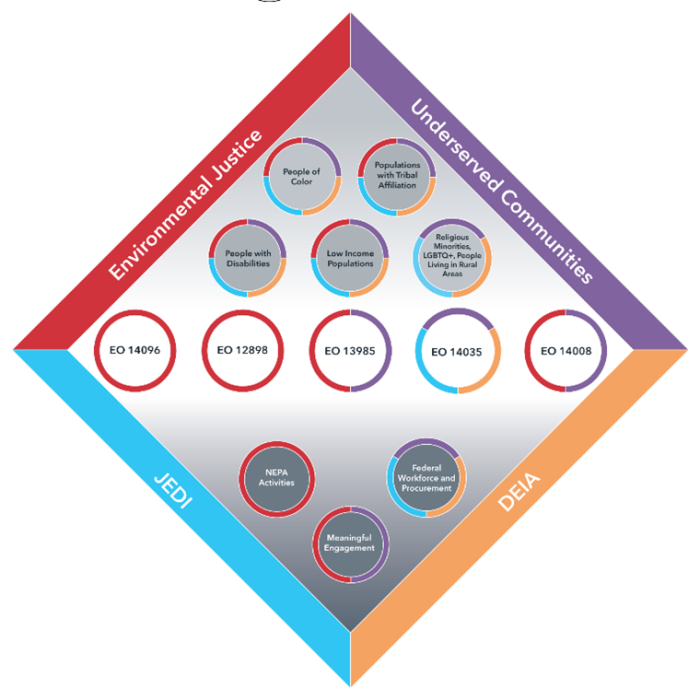
BOEM’s efforts to advance environmental justice and to support underserved communities are grounded in several policies and executive orders (E.O.s) related to broader equity principles.
We invite you to view BOEM’s first-ever Environmental Justice Implementation Plan, which details the goals, priorities, and examples for implementation of BOEM’s vision of inclusive, meaningful, and equitable opportunities for all communities to participate in the responsible management of our nation’s offshore energy, mineral, and geological resources.
You may also consult the Department of the Interior’s environmental justice policy and materials page.
As directed by E.O. 12898, Federal Actions to Address Environmental Justice in Minority Populations and Low-Income Populations, BOEM is responsible for identifying and addressing disproportionately high and adverse impacts of BOEM’s decisions on environmental justice populations, which under E.O. 12898 include minority and low-income populations, and for ensuring meaningful engagement of environmental justice populations in BOEM decision-making processes.
E.O. 14096, Revitalizing Our Nation’s Commitment to Environmental Justice for All, signed April 21, 2023, builds upon E.O. 12898 to complement and deepen ongoing environmental justice work within the Federal government. The objectives of E.O. 14096 are to: deepen a whole-of-government commitment to environmental justice; better protect overburdened communities from pollution and environmental harms; strengthen engagement with communities and mobilize federal agencies to confront existing and legacy barriers and injustices; promote the latest science, data, and research, including on cumulative impacts; expand interagency coordination and launch a new Office of Environmental Justice within the Council on Environmental Quality (CEQ); increase accountability and transparency in federal environmental justice policy; and honor and build on the foundation of ongoing environmental justice work. Guidance from CEQ on implementing the new E.O. is forthcoming.
EO 13985, Advancing Racial Equity and Support for Underserved Communities Through the Federal Government, calls on agencies to advance equity through identifying and addressing barriers to equal opportunity that underserved communities may face due to government policies and programs. E.O. 13985 defines “underserved communities” as “populations sharing a particular characteristic, as well as geographic communities, that have been systematically denied a full opportunity to participate in aspects of economic, social, and civic life, as exemplified by the list in the preceding definition of ‘equity’.” Examples of underserved communities provided in the “equity” definition in E.O. 13985 include Black, Latino, and Indigenous and Native American persons, Asian Americans and Pacific Islanders and other persons of color; members of religious minorities; LBGTQ+ persons; persons with disabilities; persons in rural areas; and persons otherwise adversely affected by persistent poverty or inequality.
Other policies and executive orders that BOEM considers in equity-related efforts include the following:
- Title VI of the Civil Rights Act of 1964
- E.O. 14008, Tackling the Climate Crisis at Home and Abroad
- E.O. 14035, Executive Order on Diversity, Equity, Inclusion, and Accessibility in the Federal Workforce
- DOI SO 3406, Establishment of a Diversity, Equity, Inclusion and Accessibility Council
- E.O. 13166, Improving Access to Services for Persons with Limited English Proficiency
- E.O. 13990, Protecting Public Health and the Environment and Restoring Science to Tackle the Climate Crisis
- E.O. 13988, Preventing and Combating Discrimination on the Basis of Gender Identity or Sexual Orientation
- E.O. 14031, Advancing Equity, Justice, and Opportunity for Asian Americans, Native Hawaiians, and Pacific Islanders
The graphic below represents the populations (five circles near the top), executive orders (five circles across the middle), and processes (three circles near the bottom) related to four focus areas at BOEM, namely:
- Environmental justice.
- Underserved communities.
- Diversity, equity, inclusion, and accessibility (DEIA).
- Justice, equality, diversity, and inclusion (JEDI).
While DEIA and JEDI addressed similar concepts, there are subtle differences. DEIA encompasses diversity, equity, inclusion, and accessibility as it relates to the Federal Government's ability to recruit, hire, develop, promote, and retain our nation's talent, and remove barriers to equal opportunity and accessibility. JEDI is an effort within BOEM to support justice, equality, diversity, and inclusion in the workplace and in the effects of BOEM's programs on all people. Each sphere within the graphic diamond is color coded according to the focus areas to which it applies. For example, Executive Order 14035 addresses underserved communities, DEIA, and JEDI, but not explicitly environmental justice.


